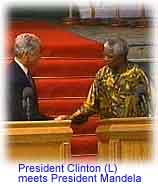
|

|
Jewish World Review / April 13, 1998 / 17 Nissan, 5758
Jonathan S. Tobin
ONE OF THE BIGGEST movie hits of the seventies made the expression "Love
means never having to say you're sorry," a popular cliche. But while the treacly
"Love Story" left a trail of wet tissues from coast to coast, it would seem
that its message went heeded. In contemporary America and elsewhere, it
seems as if everyone is apologizing for something they or their ancestors did.
One would have thought we are on the eve of Yom Kippur instead of Passover
in the last month as prominent personalities lined up to fess up to their
imagined or real guilt and others demanded apologies for their wrongs. Still
others were unrepetentant or forgetful. Here are a few of their stories.
A lot of the commentary concerning his trip concerned whether or not he
would apologize for America's role in the slave trade. Predictably, many on the
right inveighed against the idea while the left was in favor.
I, for one, have no problem with such an apology. What's wrong with Clinton
expressing "regret" for the legacy of slavery? It was evil and Americans put
up with it far too long, even if we did eventually atone for it in a bloody
war.
What was unfortunate was that the debate over apologizing (and the less
defensible idea that African-Americans should get some sort of reparations)
was not used as a way of shining a spotlight on the fact that slavery is not
entirely dead. Reports of this pernicious institution still living on in
some African countries -- in particular the Sudan where Christians have been
oppressed by the Muslim majority -- have been ignored by the mainstream
press.
Lamenting the horrors of the Middle Passage is a fine thing. But doing
something about outrages in our own time requires more political courage.
The worst moment of Mr. Clinton's trip came when he was publicly lectured by
Nelson Mandela, the president of South Africa, for daring to ask Mandela to
stop playing footsy with rogue regimes in Iran, Libya and Cuba. Because they
supported his struggle, Mandela feels he is honor bound to support them now,
no matter what the rest of the world says.
Mandela has rightly gained the status of an icon of liberty for his
suffering under the apartheid regime and for subsequently bringing that nation to
democracy. But why does he think that those who suffer under Quaddafi, the
Ayatollahs and Castro are any less deserving of human rights than his own
people? And what makes his decision to support those tyrants any less
cynical than the realpolitik practiced by the U.S. in past decades? And why should
we trust his private diplomacy instead of sanctions when it was sanctions that
helped bring his oppressors to heal?
Another person who owes somebody an apology is former President Jimmy
Carter.
Carter, a man who raised self-righteous behavior to Olympic levels during
his presidency has been working overtime to polish his stained-glass image since
he was booted from office. Much of what he does for the homeless and other
causes is wonderful, but I'll admit that his non-stop do-gooding is a bit
hard to take.
But a recent news item put him back into perspective. According to a new
book by historian Douglas Brinkley, Carter has been acting as an advisor to
Yasser Arafat. According to Brinkley, who had access to Carter's papers in his
research, Carter told Arafat to justify Palestinian Arab violence and rioting
during the intifada by saying: "The intifada exposed the injustice Palestinians suffered, just like Bull Connor's mad dogs in Birmingham."
Somehow I don't recall Martin Luther King, Jr.'s non-violent marches for
racial justice in the south including firebombs, stone throwing and murder.
Carter owes the people of Israel and especially the hundreds of Jewish
victims of intifada-related violence an apology.
But don't hold your breath.
No, I'm not referring to the new Arab-Israeli "Sesame Street" TV program produced
by Israeli Educational TV and a private Palestinian group which has been praised for its promotion of co-existence.
Rather, it is the official state TV of Arafat's Palestinian Authority - The
Palestinian Broadcasting Authority. In their version of "Sesame Street,"
called the "Children's Club," young children are encouraged to read poems
about jihad praising suicide bombers!
That gives the lie to those who think that Mr. Arafat's concern for the
lives of Jewish children will be expanded by Holocaust tourism either in Amsterdam
or Washington. It is also an egregious violation of the Oslo Accords which
specifically forbade that kind of propaganda. Even worse, the station that
broadcasts it has received half a million dollars in equipment and training
from the U.S. government!
Another apology in the news is the long putt off recognition of African-
American renaissance man Paul Robeson. A legendary athlete, singer, actor
and activist, Robeson was cruelly treated by America because of his race. A
symbol of black resistance to Jim Crow, Robeson's legacy of performance and dignity
is being celebrated by many in this, the centennial of his birth. He was
owed an apology for much injustice, even if it comes 22 years after his death.
But amid all the Robeson hoopla in the media, one unfortunate incident in
his life deserves airing, even if it does tarnish his image.
Robeson was a life-long Communist. His loyalty to the cause of the Soviet
Union may be excused by some because he naively saw it as an alternative to
the racial injustice that flawed American democracy. But unlike many
American Communists who could claim that they knew nothing of the atrocities of the
Soviet Empire, Robeson knew better but kept silent anyway.
In 1949, during one of his visits to Russia, Robeson asked to see the
Yiddish poet Itzik Feffer. Feffer, along with the actor Solomon Mikhoels and other
prominent Jews were victims of the latest anti-Semitic purge by Stalin. They
had been hosted by Robeson during a World War II visit to the U.S. as part
of Stalin's Jewish "Anti-Fascist" Committee and the great singer had been urged
to intervene on their behalf.
Mikhoels and most of the other Yiddish artists were already deep in the
Gulag or dead by the time Feffer was brought from the Lubyanka prison to meet with
Robeson, according to the well documented account in Louis Rapoport's
history Stalin's War Against the Jews (Free Press, 1990).
Unlike others in the know, Robeson had nothing to fear from the KGB if he
spoke out. He could always go home to the U.S. and then speak out. But
instead, he continued to lie on behalf of Stalin. The same year he was
publicly telling Americans there was no such thing as anti-Semitism in the
Soviet Union!
Why this hypocrisy? Robeson made his son vow not to make the story public
until well after his death, "because he had promised himself that the would
never publicly criticize the USSR." Robeson never apologized or repented for
his silence. Although he was a great singer, he was also a slave to an evil
ideology that sanctioned such lies. It seems to me that this part of his
character ought not to be ignored by those who celebrate him today.
Robeson's moral blindness to the oppression of others ought to be remembered just as
much as the injustices done to him because of his race. Being a victim
yourself doesn't mean you have the right to allow others to
 Of ends and means and victims
Of ends and means and victims
Bill and Nelson: the wrong apologies
The most famous of the recent apologies came from President Clinton on his
safari to Africa. Given the fact that his guiding personal philosophy has
been "Being president during an economic  boom means never having to say you're
sorry," about his personal behavior, he would seem an unlikely serial
apologizer. But his penchant for "feeling the pain" has also led him to add
penitential posturing to his repertoire.
boom means never having to say you're
sorry," about his personal behavior, he would seem an unlikely serial
apologizer. But his penchant for "feeling the pain" has also led him to add
penitential posturing to his repertoire.
Another reason I can't stand Jimmy Carter
The children of Arafat
Carter's pal, Yasser Arafat, got a little free publicity the other day by visiting the Anne Frank House in Amsterdam. Reportedly, the visit was low key and the man who has the blood of many other Jewish children on his hands managed not embarrass his hosts too much. But ironically, that same week a report on the children's programming on Palestinian Authority Television came to light.
Paul Robeson and the murdered Yiddish poets
Silence in the face of the oppression of others
Though he had been cleaned up and dressed in a suit, Feffer's fingernails
had been torn out. Though he couldn't speak openly, Robeson later told his son
that the poet indicated by gestures and a few handwritten words that
Mikhoels had been murdered on the orders of Stalin and that the other Jewish
prisoners were being prepared for the same fate. After the two friends said goodbye,
Feffer was taken back to the Lubyanka (the same place where Natan Sharansky
and other refuseniks would be imprisoned decades later). He would never be
seen alive again.
JWR contributor Jonathan S. Tobin is executive editor of the Connecticut Jewish Ledger.
4/5/98: Hang up on Albright
3/29/98: Bigshots or activists?: Clinton's three clerics return from China
3/27/98: Will American Jews help Clinton push Israel into a corner?
3/22/98: Anti-Semitism then and now
3/15/98: Still searching for Jews at the opera
3/11/98: Remembering Eric Breindel
3/8/98: Getting lost in history
3/5/98: Follow the money to Hamas
2/22/98: Re-writing "Anne Frank" - A distorted legacy
2/15/98: Religious persecution is still a Jewish issue
2/6/98: A lost cause remembered (the failure of the Bund)
2/1/98: Economic aid is not in Israel's interest
1/25/98: Jews are news, and a fair shake for Israel is hard to find